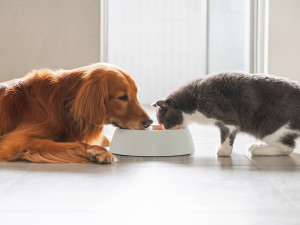Toys Containing BPA May Cause Obesity in Dogs, New Study Finds
The chemical has been linked to a variety of health problems in animals.

share article
Bisphenol A, aka BPA, is a chemical compound used in many plastics — and for years, it has been linked to a variety of health problems in humans and animals. For dogs, one potential source of exposure to BPA is also one of their greatest joys: their toy box. A new studyopens in a new tab published in Chemosphere finds that chewing on toys containing BPA may lead to obesity in dogs.
The dangers of BPA for dogs
BPA has been associated with a variety of health issues for years now. While the Food and Drug Administration (FDA) has stated opens in a new tab that low levels of BPA are safe, some experts disagree. High levels of BPA have been linked toopens in a new tab high blood pressure, diabetes, and cardiovascular issues.
BPA also disrupts the endocrine systemopens in a new tab, causing hormonal changes. In dogs and humans, these changes have been associated with infertilityopens in a new tab.
One study investigatedopens in a new tab the impact of dogs eating canned food from containers containing BPA. Researchers found that when 14 pets were switched to a canned food diet, their BPA-levels increased three-fold. It also confirmed that BPA can affect an animal’s gut microbiome, which can lead to gastrointestinal, neurological, and immunological health problems, potentially including some cancers.
Plus, what’s bad for the earth is bad for all of us. BPA is terrible for the environment; the Environmental Working Groupopens in a new tab states that it’s a major pollutant of the air, water, and soil. One study foundopens in a new tab that in high levels, BPA decreases photosynthesis in plants.
New research links some plastic toys to obesity
Researchers recently set out to find out more about BPA’s impact on dogs’ health. They found that when dogs chew toys containing BPA, the BPA is released into their saliva. It then alters certain gene receptors, leading to the creation of more fat cells. “Our findings suggest that companion dogs are at risk of BPA exposure, which may contribute to obesity in dogs,” Eun-Jung Park, the study’s lead author, wrote.
Park adds that “the implementation of precautionary measures is crucial.” Luckily, many dog toys are BPA-free. West Paw is one petcare companyopens in a new tab making durable, elastic toys that are BPA- and Phthalate-free. Other non-plastic options, like toys made from wood, wool, or rope may be safer options, too. When looking for plush toys, keep in mind that the squeakers inside plush toys may be made of plastic, and some stuffing may be plastic.
You can protect your pup by researching materials used to make the pet toys before purchasing. Keep in mind that there is currently no ban on BPA by the FDA, so FDA-approved dog products aren’t necessarily BPA-free.

Sio Hornbuckle
Sio Hornbuckle is a writer living in New York City with their cat, Toni Collette.
Related articles
![A dog and a cat eating from the same food dish.]() opens in a new tab
opens in a new tabHelp Your Chonky Pet Lose Weight
This National Pet Obesity Awareness Day, here are pro tips to help make sure your pet isn’t packing on too many pounds.
![A dog tugging on a toy outside]() opens in a new tab
opens in a new tabThe Definitive Guide to Choosing Safe Dog Toys
Tips for pet parents who want their pups to have safe fun.
![Woman and white dog playing with puzzle.]() opens in a new tab
opens in a new tab6 Genius Interactive Dog Toys From Nina Ottosson
These puzzle toys are made to help you bond with your pup.
![eco-friendly pet parent pets down inside of indoor garden]() opens in a new tab
opens in a new tabHow to Be an Eco-Friendly Pet Parent
Reducing your paw print can seem daunting. Consider these simple tips.
![Border Collie digging into a plate of dog food while seated at a yellow table]() opens in a new tab
opens in a new tabHow You Can Easily Manage Your Dog’s Weight
Keep your pup’s weight down, and you could add years to their life. What’s better than that?





